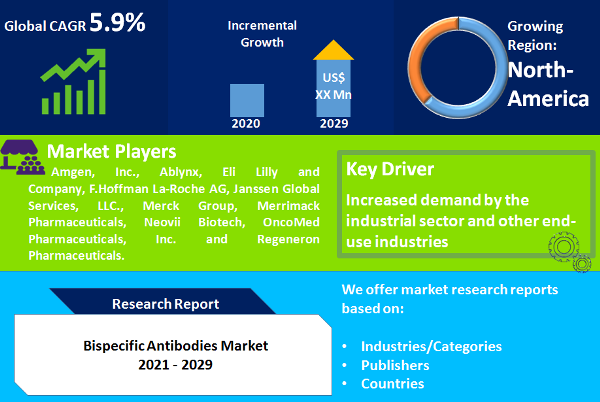Industry Outlook
The bispecific antibodies market is set to grow with a compounded annual growth rate (CAGR) of 5.9% during the forecast period from 2022 to 2030. According to the research findings presented by the World Health Organization (WHO), in 2022 cancer is responsible for the death of approximately 9.6 million people throughout the globe. The severe adverse effects related to chemotherapy led to the development of bispecific antibodies for the treatment of cancer. Currently 2 drugs are approved by the U.S.FDA catumaxomab and blinatumomab. 30 bispecific antibodies are in the pipeline undergoing clinical trial studies. The competition exerted by monoclonal antibodies for the treatment of the same disease condition act as a major limitation for the bispecific antibodies market growth.
"Longer serum half-life and excellent cytotoxicity profile drive the IgG like molecule market"
Immunoglobulin G (IgG) like molecule is leading the type segment for bispecific antibodies market. IgG like molecule such as catumaxomab (Fresenius Biotech and Trion Pharma), is widely employed for the treatment of malignant ascites due to its inherent features such as longer serum half-life and excellent cytotoxicity profile. Non IgG like molecule will be the fastest growing market during the forecast period owing to the recent launch of blinatumomab (Amgen, Inc.) for the treatment of refractory B-cell acute lymphoblastic leukemia on account of its smaller half-life and enhanced tissue penetration characteristics.

"Severe adverse effect related to current treatment regime and burgeoning requirement for targeted drug delivery drive oncology market growth"
In the current scenario oncology is reigning the application segment for bispecific antibodies market. The factors responsible for its growth are the severe adverse effects related to current treatment regimen and burgeoning requirement of targeted drug delivery for the treatment of cancer. Bispecific antibodies has the ability to cater the current requirement in cancer treatment by redirecting immune effector cells towards tumor cells, blocking signaling pathways and targeting tumor angiogenesis. Autoimmune diseases such as plaque psoriasis and rheumatoid arthritis will be treated in the near future by employing bispecific antibodies such as IL-6R × HAS (Ablynx) and IL-17A/F (Merck Group) by blocking the proinflammatory cytokines. Few bispecific antibodies are in the pipeline which will be utilized for the treatment of ailments such as wet age related macular degeneration (AMD) and idiopathic pulmonary fibrosis.
"Increasing mortality and lack of effective treatment for cancer drive the Bispecific antibodies market in North America"
North America is currently leading the geographical segment for Bispecific antibodies market. The major attributes responsible for the dominance of North America are increasing mortality and lack of effective treatment for cancer. According to the Center for Disease Control and Prevention (CDC), cancer is the second largest cause of mortality in the United States, resulting in 1 in 4 deaths due to cancer. Bispecific antibodies market in Europe is driven by factors such as increased funding by government healthcare agencies in the drug discovery and cancer prevention program. Domicile of key players such as Merck Group, F.Hoffman La-Roche AG and Janssen Global Services, LLC., etc. provide impetus to the growth of Bispecific antibodies in Europe. Asia Pacific is set to register positive growth during the forecast period 2022 to 2030 owing to rising prevalence of cancer and supportive regulatory environment for the approval and distribution of bispecific antibodies.
Biopharmaceuticals companies providing Bispecific antibodies are Amgen, Inc., Ablynx, Eli Lilly and Company, F.Hoffman La-Roche AG, Janssen Global Services, LLC., Merck Group, Merrimack Pharmaceuticals, Neovii Biotech, OncoMed Pharmaceuticals, Inc. and Regeneron Pharmaceuticals.
Historical & Forecast Period
This study report represents analysis of each segment from 2024 to 2034 considering 2025 as the base year. Compounded Annual Growth Rate (CAGR) for each of the respective segments estimated for the forecast period of 2026 to 2034.
The current report comprises of quantitative market estimations for each micro market for every geographical region and qualitative market analysis such as micro and macro environment analysis, market trends, competitive intelligence, segment analysis, porters five force model, top winning strategies, top investment markets, emerging trends and technological analysis, case studies, strategic conclusions and recommendations and other key market insights.
Research Methodology
The complete research study was conducted in three phases, namely: secondary research, primary research, and expert panel review. key data point that enables the estimation of Bispecific Antibodies market are as follows:
Market forecast was performed through proprietary software that analyzes various qualitative and quantitative factors. Growth rate and CAGR were estimated through intensive secondary and primary research. Data triangulation across various data points provides accuracy across various analyzed market segments in the report. Application of both top down and bottom-up approach for validation of market estimation assures logical, methodical and mathematical consistency of the quantitative data.
| ATTRIBUTE | DETAILS |
|---|---|
| Research Period | 2024-2034 |
| Base Year | 2025 |
| Forecast Period | 2026-2034 |
| Historical Year | 2024 |
| Unit | USD Million |
| Segmentation | |
Type
|
|
Application
|
|
|
Region Segment (2024-2034; US$ Million)
|
Key questions answered in this report